 Image search results - "canoe" Image search results - "canoe" |

June 9, 2007. Hula dancers rush to Pukari Sanbashi Pier where the Hokule'a canoe is to dock. ぷかりさん橋
|
|

A crowd of a few hundred on hand to greet Hokule'a's arrival.
|
|

People crowd the waterfront near Pukari Sanbashi Pier.
|
|

People crowd the waterfront near Pukari Sanbashi Pier.
|
|

Hokule'a already in sight well before 11 am when it was scheduled to dock.
|
|

Hokule'a and escort ship Kama Hele. What makes this canoe so special and famous is that it was used to sail from Hawaii to Tahiti (and many other places) without any modern navigational instruments.
|
|

They only referred to the sun, moon, the stars, and ocean waves to navigate through the vast Pacific Ocean or Polynesia. This is called celestial navigation. Extremely few people can do this, and the Hawaiians are learning this skill of long-ago.
|
|

They wanted to prove that the original native Hawaiians were able to sail between Tahiti to Hawaii on purpose, and that they did not land on Hawaii by accident.
|
|

Hokule'a and Yokohama Bay Bridge in the background.
|
|

One sail unraveled.
|
|

Nearing Pukari Sanbashi Pier. The question was, which side of the pier would it dock? (Was going the other side so I rushed over to the other side.)
|
|

Hokule'a nears the dock.
|
|

A rope is thrown to the dock from Hokule'a.
|
|

Hokule'a arrives right on schedule at 11 am on June 9, 2007. Yokohama is its last stop.
|
|

Hula dancers
|
|

Conch shell blowers signal the canoe's arrival.
|
|

Pulling Hawaii's most famous canoe to dock.
|
|

Under overcast skies, Hokule'a docks.
|
|
|

Escort ship (powered by a Yanmar engine) Kama Hele also docks soon afterward.
|
|

Koinobori carp streamers adorn Hokule'a. A great Japanese touch.
|
|
|

Escort ship Kama Hele flying the Japanese, Hawaiian, and Yanmar flags at Yokohama.
|
|

Welcome banner from Yanmar
|
|

Crowd on the waterfront near the pier.
|
|

Hokule'a crew members
|
|

The Royal Order of Kamehameha I take part in arrival ceremonies. 入港式
|
|

Hokule'a arrival ceremonies
|
|

Captain Bruce Blankenfeld places a lei on the bow.
|
|

Hula dancers
|
|

Hula dancers take part in arrival ceremonies.
|
|
|

Hokule'a crew dance on the canoe.
|
|

Royal Order of Kamehameha I
|
|

Royal Order of Kamehameha I wear red and gold capes.
|
|

Royal Order of Kamehameha I leave the pier.
|
|
|
|

Conch shell blower
|
|

Crew members hug each other.
|
|

Former Yokozuna Akebono (blue shirt) and his family were also on the pier. (Wife and daughter in orange.)
|
|

Nainoa Thompson and other crew members get off the boat. Nainoa was on board, but was not part of the crew who brought the canoe to Yokohama.
|
|
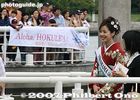
Miss Yokohama also took part in the arrival ceremonies.
|
|

Arrival ceremony ends and people start to leave the pier.
|
|

Future Hokule'a Captain, Ka'iu Murphy.
|
|

All the crew members met applause and handshakes.
|
|

All the crew members were very friendly to all. This is Captain/Navigator Chadd Paishon.
|
|
|

Kimo
|
|

Captain Blankenfeld who piloted the canoe to Yokohama.
|
|

Finally, Nainoa Thompson makes his way from the pier and into the crowd.
|
|

Nainoa Thompson
|
|

Nainoa shook every single hand.
|
|

He shook hands with EVERYBODY and ANYBODY.
|
|
|

The crowd was thrilled to be so close to this man full of aloha.
|
|

People line up to shake Nainoa's hand or get his autograph or take his picture.
|
|
|
|

Nainoa has a habit of crouching on his knees so he can use his knee as a backing to sign autographs.
|
|

"Here you go!"
|
|

Plus a handshake for this little guy...
|
|

He never refused to sign an autograph.
|
|
|

He never refused to shake a hand.
|
|

This woman put a small necklace on him.
|
|

I have never seen anyone who shook everybody's hand, signed autographs for everyone, and posed for all photographers. ナイノア・トンプソン
|
|

Finally at the end, a little girl's artwork on a sheet of cloth catches his eye.
|
|

He poses with the girl.
|
|

He was so touched and impressed that he gave her a hug.
|
|

He actually wanted her to keep her magnificant work of art, but she wanted him to have it.
|
|

The little girl was in awe and speechless.
|
|

He accepts the little girl's impressive gift.
|
|

He folds the sheet neatly and carries it with him to a press conference which he was late in attending. An ideal Goodwill Ambassador.
|
|

June 10, 2007. A formal welcoming ceremony was held the next day on an outdoor terrace near the pier. Unfortunately, it was a rainy day and attendance was much smaller than the day before. 入港歓迎セレモニー
|
|

Captain Blankenfeld receives a gift.
|
|

The ceremony included hula chanting and dancing.
|
|
|
|
|

A local taiko troupe give a spectacular performance. 学校法人国際学園 星槎国際高等学校
|
|
|
|

In return, the crew performs the haka dance.
|
|

A small crowd watch the welcome ceremony. パシフィコ横浜国立大ホール前テラス
|
|

Hula dancers watch the ceremony
|
|

Nainoa Thompson gives a thank you speech with Hokule'a's captains.
|
|
|
|
|
|

Nainoa Thompson gave a touching speech about Japan-Hawaii friendship, their rediscovery of Japan ("Japan is not just Tokyo"), and Hokule'a's mission.
|
|
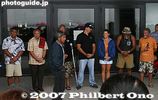
Nainoa introduces the rest of the crew and future Hokule'a captains being groomed to take over.
|
|
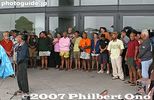
Hokule'a crew on stage.
|
|
|
|

Hokule'a at Yokohama
|
|

Hokule'a and Kama Hele in Yokohama, June 10, 2007
|
|
|

Pukari Sanbashi Pier. Hokule'a can be seen on the left. On the right is another pier for sightseeing boats. The building in the middle is a resthouse.
|
|

Pukari Sanbashi Pier in Minato Mirai, Yokohama, Japan. Hokule'a docked on the left (arrived June 9, 2007).
|
|

Hokule'a in Yokohama for the first time. This boat was first launched on March 8, 1975. It has become part of Hawaii's modern soul and spirit.
|
|

What makes this canoe so special and famous is that it was used to sail from Hawaii to Tahiti (and many other places) without any modern navigational instruments.
|
|

Escort ship Kama Hele
|
|

Hokule'a tour guests walk on the dock to the boat. The canoe is little over 62 feet long. They only referred to the sun, moon, the stars, and ocean waves to navigate through the vast Pacific Ocean or Polynesia. This is called celestial navigation.
|
|

Like at its other stops in Japan, Hokule'a offered free onboard canoe tours to the public during its one-week stay in Yokohama. A reservation ticket (seiriken) had to be obtained beforehand. (I got one at 1:30 pm on June 11, 2007.)We could see the top deck, rudder, masts, cramped sleeping quarters, food pantry, and more of this legendary canoe named after a star named Hokulea in Hawaiian. Entry to Hokule'a canoe tour on June 11, 2007.
|
|

This was during the 2 pm - 4 pm tour, and by 2:20 pm, the Hokule'a canoe tour reception desk says tours are all full. ホクレア号乗船見学会
|
|

First we were given life vests. The tour started with an illustrated talk by a man named Kimo.
|
|
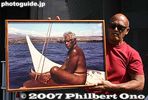
He showed various pictures and gave an overview of some basic concepts.
|
|

"You don't need muscle to do it. It's more mind-oriented..."
|
|

He showed sample parts of the boat.
|
|

Hokule'a
|
|

First time that I've gotten this close to Hawaii's most famous canoe.
|
|

We were then allowed to enter the pier where Hokule'a was docked.
|
|

The tour group was split into two. One group here was at the stern, listening to a talk by Kanako Uchino, a Japanese crew member.
|
|

The other group was at the bow listening to a talk by another crew member.
|
|

The white vertical board (the woman sitting on it) is a splash guard (called pale wai or pale kai).
|
|
|

Bow
|
|

Leis on the bow endpieces (Manu ihu).
|
|

Mast complemented by koinobori carp.
|
|

Koinobori carp streamers for a Japanese touch. These are flown in Japan during early May for Children's Day.
|
|

Ropes crisscross everywhere.
|
|
|

Kanako Uchino talks about the canoe in Japanese.
|
|

Holding on to the steering paddle so it doesn't bump anyone.
|
|

Rudder going into the water
|
|

Stern. The pointy stern endpieces are called "Manu hope" in Hawaiian.
|
|

Solar panel in the forefront. Power is used for communications equipment.
|
|

Male god on the left.
|
|
|

Female goddess on the right.
|
|

Navigator's seat (kilo) at the stern. The black thing is apparently a seat cushion. Another one on the opposite side.
|
|

Fresh food storage (onions)
|
|
|

All the fresh food (perishables) are consumed during the first few days after leaving a port. After that, it's canned food, dry goods, and fish caught in the water.
|
|

Canoe deck (pola)
|
|

Canoe deck is littered with waterproof containers for food and other essentials.
|
|

Galley
|
|

Galley or "da kitchen."
|
|

Food
|
|
|

Captain's dry things
|
|

Covering the top of hull is a canvas covering (kapalina) fastened by rope to the safety railing (palekana). The canvas is also a tent-like roof for the sleeping quarters.
|
|

Above both hulls are storage bins and sleeping quarters.
|
|

Sleeping compartment provides bed padding with a built-in pillow. Above it is the canvas covering (kapalina).
|
|

Under the bed padding (red) is storage bins, including an opening to the hull where more stuff is stored.
|
|

Canvas covering (kapalina) the sleeping quarters over the hull.
|
|

Hull storage. The wooden cover was made by a Japanese carpenter whose name is on it. Many parts of Hokule'a bear the name of the person who made that part.
|
|

Base of aft mast (Kia hope). The woodwork here was exquisite, and looked quite expensive.
|
|

Aft sail
|
|

Talk by crew member named Dean. The interpreter was Kyoko Ikeda, Asian Pacific Leadership student.
|
|

Rudder
|
|

Rudder (steering paddle or Hoe uli)
|
|

Close-up of steering paddle or Hoe uli, made of wood.
|
|
|

Getting off the canoe
|
|

Pier
|
|

Escort ship Kama Hele (not open to visitors)
|
|

Japanese, Hawaiian, and Yanmar (sponsor) flags on the Kama Hele, escort boat for Hokule'a. (Yanmar is a marine engine maker from Shiga Prefecture.)
|
|

Stern of Kama Hele (Yanmar engine hidden below)
|
|

Other sponsors
|
|

View from pier
|
|

Hokule'a T-shirt sold by the Hawaii Visitors Bureau (all sold out).
|
|

Welcome banner.
|
|
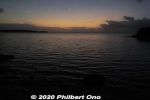
Mouth of Maira River (マイラ川) before sunrise, short drive from the main town of Ohara. Sunrise was about 6:50 am.
|
|
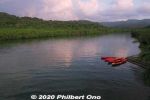
There was this dock where we could get on our kayaks. Maira River, Iriomote.
|
|
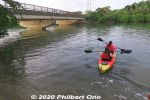
Off we go. The water was shallow, but we still wore lifejackets.
|
|

We were on time for the sunrise.
|
|
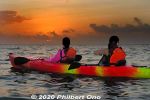
A few clouds, but the sunrise was getting to be nice.
|
|
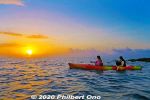
We anchored to watch the sunrise.
|
|
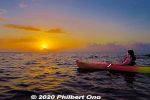
Sunrise kayaking on Iriomote, Yaeyama, Okinawa.
|
|
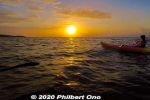
Sunrise kayaking on Iriomote, Yaeyama, Okinawa.
|
|

Sunrise kayaking on Iriomote, Yaeyama, Okinawa.
|
|
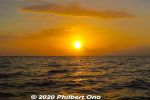
Iriomote sunrise at Maira River.
|
|
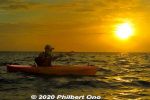
Our guide was Harubaru, but he doesn't normally do sunrise kayaking unless you ask him to: http://harubaru-iriomote.okinawa/course/
|
|
|
|

After the sunrise, we paddled along the mangroves on the river's edge.
|
|

After the sunrise, we paddled along the mangroves on the river's edge.
|
|
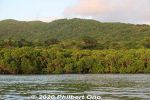
Maira River lined with mangroves.
|
|

Lovely morning, too bad we didn't have time to kayak more upstream on Maira River, Iriomote.
|
|
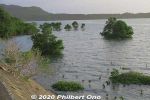
Mouth of Maira River at high tide. The brackish water is quite shallow, no more than 1 or 2 feet deep.
|
|
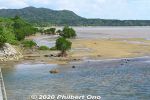
Mouth of Maira River at low tide when we passed by the day before.
|
|
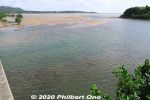
Mouth of Maira River at low tide when we passed by the day before.
|
|
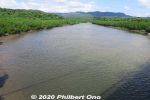
Maira River, Iriomote.
|
|
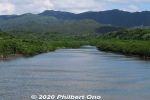
Maira River, Iriomote. There's a waterfall upstream, but we didn't have time.
|
|
|
|
|
|